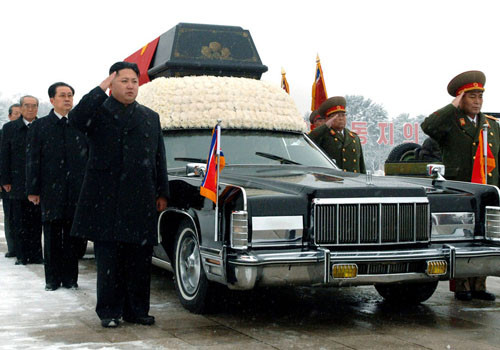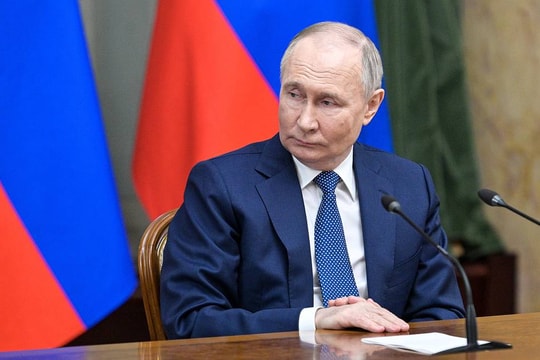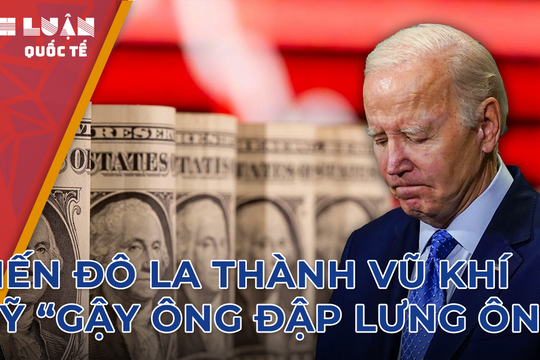The secret behind North Korea's 'piggy bank'
Despite economic isolation, North Korea has found many ways to circumvent the law to earn a large amount of foreign currency.
 |
North Korean leader Kim Jong-un (left) stands next to the Lincoln Continental carrying the coffin of late leader Kim Jong-Il. Photo: AP. |
When leader Kim Jong-un appeared in public in a shiny black Mercedes Benz worth an estimated $2 million, the world couldn't help but wonder who sold those supercars to North Korea?
In addition to luxury limousines, leader Kim Jong-un also owns a $6 million yacht and a $35 million Masikryong ski resort, CNN reported, citing information from an international organization that monitors North Korea's economic activities.
Since 2006, the United Nations has tightened sanctions on North Korea over its controversial nuclear program. The United States and its allies have for years sought to cut off the North Korean government's money supply, including freezing all North Korean transactions in the global banking system.
However, according to a 2014 United Nations report, in 2012 the North Korean government spent $645.8 million on luxury goods, equivalent to 19% of the country's total $3.47 billion in 2015.
If we exclude China, North Korea's largest trading partner, about 75 percent of its exports go to its neighbor, the value of North Korea's luxury goods imports is larger than the total value of all other goods imported combined, according to an analysis of international trade data by the Observatory of Economic Complexity.
Foreign currency supply
The US Central Intelligence Agency (CIA) considers North Korea to be one of the "least open" countries in the world.
"Large military expenditure has drained resources needed for investment and consumption. Industrial and energy production has stagnated for years. Weather-related crop failures have further aggravated food shortages," the agency said.
So where does the foreign currency flow into North Korea come from? CNN news agency quoted experts as saying that the government of this country has many ways to circumvent the law to bring foreign currency revenue back to the country. In addition to exporting coal and illegal labor, North Korea is accused of conducting cyber attacks targeting banks around the world, smuggling weapons, producing counterfeit money, and even trading rare and endangered animals. A US congressional study published in 2008 estimated that Pyongyang earns between $500 million and $1 billion each year from these illegal activities.
“North Korea will sell anything that can be sold to anyone as long as it is ‘cash on delivery,’” Anthony Ruggiero, a former US treasury secretary, said at a forum on democracies in June.
This source of foreign currency not only helps North Korea develop its weapons and nuclear programs, consolidate the power and position of leader Kim Jong-un, but also supports Pyongyang in neutralizing pressure from the US and its allies.
“Foreign currency goes straight into the bank accounts of the North Korean leadership,” said University of Missouri professor Sheena Greitens, who has been tracking North Korea’s financial activities for the past 10 to 15 years.
Economic stick
Analysts say only by tracking down and blocking secret sources of foreign currency flowing into North Korea can US President Donald Trump exert enough pressure to make the North Korean leader agree to sit down at the negotiating table.
In theory, it sounds easy, but in practice, cutting off Pyongyang's foreign currency earnings is not so simple. North Korea will always find new ways to send money home.
"(Pyongyang) is really good at finding new ways to circumvent the law, very creative with ways to generate foreign currency, sometimes that entails changing the geography of illegal activities," Professor Greitens said, adding that North Korea's ability to improvise must be controlled.
"North Korea has built an offshore system that is able to withstand the pressure of all international sanctions, largely by cleverly hiding and camouflaging its illicit trade activities under the guise of legitimate activities," said John Park, a North Korea expert at Harvard University.
To deal with Pyongyang's unpredictable ability to improvise, US Secretary of State Rex Tillerson said the US is ready to sanction third parties that help North Korea circumvent the law.
Although Secretary of State Tillerson did not specify how the US would punish countries that trade illegally with Pyongyang, the US is currently asking countries to narrow diplomatic relations with North Korea.
"What we are doing is asking countries to reconsider their diplomatic relations with North Korea," said W. Patrick Murphy, US Deputy Assistant Secretary of State for Southeast Asia. Murphy also emphasized that the US is putting pressure on Southeast Asian countries.
However, the effectiveness of this measure remains an unanswered question.
"Countries in the Southeast Asian region still maintain connections with North Korea on many fronts, diplomatically, culturally and economically. And they have demonstrated that they want to maintain this relationship... It will be up to them to decide how they will deal with North Korea," according to the Diplomat magazine.
The China factor
“If you want to cut off all of Pyongyang’s revenue sources… Ultimately, you still have to come back to the question of what you’re going to do with China,” concluded former US Treasury official Ruggiero.
As North Korea becomes increasingly isolated, it becomes increasingly dependent on China, its closest ally, its biggest supplier and its most influential country. About 85% of North Korea's exports go to China and 76% of its imports also come from China, according to United Nations figures.
The US will need China's support to rein in North Korea, experts say.
Last November, Beijing agreed to toughen its enforcement of UN sanctions against North Korea. One of North Korea’s biggest sources of foreign currency comes from the sale of millions of tons of coal to China each year, which accounted for about a third of North Korea’s official exports in 2015. As a result, China decided to stop importing coal from North Korea on February 19.
However, China has never tightened its trade and economic grip on its East Asian neighbor because North Korea remains an important economic and political buffer zone for Beijing to deal with South Korea, a key US ally, former CIA director David Cohen commented.
John Park, director of the Korea Working Group at Harvard Kennedy School, believes Pyongyang is storing "huge amounts of money" in Chinese banks.
According to CNN, investigations by the United Nations and the US government have also found evidence that North Korea is using a network of shell companies to transact through banks around the world. Mr. Anthony Ruggiero warned that the US will intervene to prevent Chinese banks from continuing to help Pyongyang.
“Ultimately, you will still have to go after the Chinese banks and companies that colluded with Pyongyang to evade international sanctions,” Ruggiero said.
According to VNE
| RELATED NEWS |
|---|



